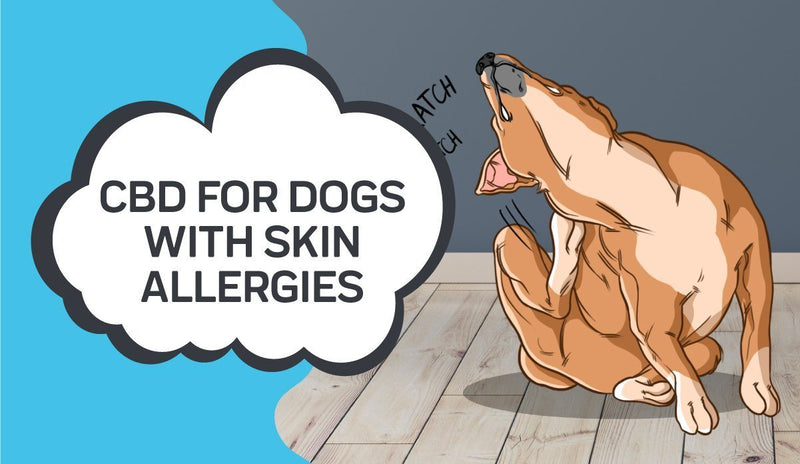- Reasons Behind Skin Allergies
- CBD vs THC: Which is Right for Dog Skin Allergies?
- Skin Allergies
- Atopic Dermatitis
- Cures for Dog Allergies
- CBD Treatments
- Buying CBD Oil for Dogs

Is your dog constantly scratching his or her fur? Does your pup lick himself over and over in the same area? Does your canine seem to be paying more attention to a particular place on her body?
If the answer to any of these questions is yes, then there is a good chance your furry friend has a skin allergy. Humans get allergic reactions to many common sources, such as pet dander, plant pollen, and bugs.
Dog allergies come from those same sources but they are far less equipped to deal with them. So when you see your pup grooming himself all day, consider checking to see if he has irritations on his skin.
Dog skin allergies present themselves in a few different ways. You should observe your dog’s behavior and check for persistent grooming, as well as areas where your dog seems to favor or scratch often. You can also physically feel for sores and look at your dog’s coat to identify any visible rashes. Skin allergies can be very uncomfortable for dogs, especially when the canine can’t quite heal their pain by themselves.
Veterinarians may suggest traditional treatment methods like antibiotics and creams, but have you ever considered a natural approach? Humans have been using CBD oil on themselves for stress and pain management, but it’s also safe for your furry little buddy! Consider using Innovet's CBD for dog allergies as a healthier alternative solution to prescription drugs.
Noticing issues with your pet can be very stressful. Skin allergies can be tricky and they aren’t the most fun to deal with, to state the obvious.
Fortunately, if you have a dog with skin allergies, we can walk you through the process of identifying an ailment and seeking an appropriate plan for treatment. More specifically, we’ll explain the use of CBD for dog allergies.

Reasons Behind Skin Allergies
What causes skin allergy? Ultimately, allergies may be a result of genetics if they are hereditary allergies, but by nature, not all allergies are caused by genetics. By researching the dog’s parents and finding out whether they have hereditary allergies would be a good indicator of whether or not a dog is having an allergic response.
Skin allergies in dogs are caused by similar things that humans are afflicted by, and most allergies stem from things that float around in the air. The most common offenders to watch out for are...
Pollen
Pollen refers to the tricky little spores we can’t see but they circulate throughout the outdoors. Pollen comes directly from plants but bees carry it near and far as in the act of making honey.
Unfortunately for any organism that does not live in nature, pollen is a foreign substance to the immune system, including those of dogs. Pollen is one of the most common causes of skin allergies for dogs.
Pests

Bugs and insects carry all kinds of bacteria that aren’t healthy for dogs. Whether it be a dust mite or a flea, bugs are prone to biting dogs, leaving your dog feeling very uncomfortable. These tiny foes can be really difficult to see and get rid of due to the fact that they are so small, especially compared to dogs. Routine care and check-ups with the groomers are required to ensure your dog isn’t afflicted by parasites. Better still, make sure your pooch is always protected with flea and tick prevention.
Fur
It seems perfectly normal for humans to be allergic to pet dander. But can you believe that it is entirely possible for your dog to be allergic to pet dander, too? As unlucky as it sounds, your dog might just be a bit allergic to his or her best dog friend’s fur.
Mold
Mold is never a good thing, and logically, it should never be inhaled or touched. Humans understand this, but dogs don’t have a clue what mold is, so they won’t know to stay away from it.
Mold is often found outside in nature, but it can also be found within the walls of your own house. If you and your dog have allergies without a clear reason, it may be due to mold growing inside your house.
Hygiene
Good hygiene is great, but poor hygiene can cause a serious skin allergy for dogs. Dirt, debris, saliva, and anything else that touches your dog can get stuck, eventually leading to a build-up of unwanted germs.
If a dog has subpar hygiene, then they can develop acne, similar to the way humans do.
Genetics
As with humans, dogs are directly affected by their parents. Certain traits do pass from parent to child, and that absolutely applies to hereditary allergies. If either of a dog’s parents has skin allergies, it becomes much more likely that their offspring will have skin allergies, too.
Additionally, the breed of your dog plays a large role. Certain breeds are predisposed to skin allergies, while some may be more resistant to them.
There is a multitude of things that could cause a dog to develop a skin allergy. This is why we encourage you to properly care for your dog by checking its coat regularly. Doing so will allow you to ensure that there isn’t any inflammation or sore skin occurring.
The best way to deal with skin allergies is to prevent them in the first place. Remember to wipe your dog’s paws after walks and to give them a good washing often. In the event your dog does have skin allergies, try using a CBD allergy treatment!
CBD vs THC: Which is Right for Dog Skin Allergies?
When hearing the term CBD oil, many people think of THC and cannabis. The two are closely correlated, but they have very distinct differences that separate them. THC is present in marijuana and serves as the psychoactive component responsible for creating the euphoric, pleasant high for those who ingest it.
CBD oil consists of the same chemical components that comprise THC, but the defining difference is that the atoms of CBD are aligned differently. This results in a substance very similar to THC, but without extreme euphoria and heightened levels of calmness.
CBD is like a muted version of THC if you will. CBD oil reduces existing discomforts without causing psychoactive changes and mind-altering responses.
Both CBD and THC interact with the endocannabinoid system, which is responsible for the regulation of hunger, moods, memory, and pain tolerance. CBD and THC stimulate the endocannabinoid system in order to promote positive effects.
The key difference between the two cannabis-related substances is that THC is a psychoactive drug, meaning it can have negative side effects for those who do not respond well to mind-altering substances.
CBD oil, and especially pure CBD oil that is derived from hemp, can provide the same benefits as THC without causing changes to a dog’s cognitive abilities.
THC is often used to help reduce pain, stimulate appetite, promote relaxation, reduce stress, lower anxiety levels, and cure problems involving sleep. With these benefits also comes the feeling of being high, which has seriously detrimental effects in terms of dogs.
These side effects include itchy eyes, nausea, a lack of energy, and intense anxiety, particularly in the case of higher doses.
Just like humans, dogs will become high if they ingest THC. Dogs are far more receptive though because they have more cannabinoid receptors than humans do.
Receptors interact with THC in order to reach the endocannabinoid system, which means that if a dog were to ingest the same amount of THC as a human, it would be far more potent to the dog.
Yikes! It makes sense though, seeing as humans are much bigger than dogs, meaning humans are more equipped to tolerate larger amounts of THC at one time.
When dogs ingest THC, they have similar side effects as humans, but to a much more severe degree. Your dog may have problems breathing, controlling urine, and moving around in general.
THC is not safe for dogs, and there is not enough research to support the claim that THC benefits dogs in any way, shape, or form.
The cannabinoid, CBD is much friendlier and safer for dogs than THC. In fact, THC is a big no-no for canines, no matter the situation. On the contrary, CBD is backed by evidence which claims it provides great benefits to dogs. But is CBD oil good for dogs, even though THC is not?
CBD oil absolutely is! It can help soothe a dog’s pain, appetite problems, anxiety, and skin allergies.
Skin Allergies
Skin allergies are actually fairly common when it comes to dogs. Just like any other kind of allergy, a skin allergy is the dog's immune system response to a foreign matter that does not mesh with the body.
This will cause your dog to excessively scratch and/or groom themselves in response to the allergen.
Knowing that your dog has skin allergies isn’t always an obvious thing. Dogs are wonderful, but they cannot speak to us and say, “I think that tasty dandelion I ate outside is irritating my skin! I’m having an allergic reaction!”
They’re probably thinking something along those lines, but they have no way to really tell us.
Fortunately for our beloved pet owners, we can identify allergic reactions by paying attention to our dog’s behavior. The most obvious sign of a skin allergy is the scratching and chewing of irritated areas.
Skin allergies are really uncomfortable for dogs, so they turn to groom and scratching as a way of attempting to ease the discomfort.
With more serious reactions, dogs can lose hair which can lead to entire patches of fur being absent, if left untreated for too long. Keep an eye out for coughing or sneezing as these symptoms could be due to respiratory issues related to skin allergies as well.
You should also pay close attention to your dog’s paws as those can be indicative of how your dog is feeling. If your dog has very red paws and persistently licks them, they probably have a skin allergy.
Dog skin allergies can be very frustrating for your dog to deal with, and allergens are everywhere, so allergies are often an inevitability for pups of all breeds. To make matters worse, dogs are not equipped to deal with skin allergies so they are left scratching and chewing their irritated skin in an effort to soothe their unfortunate discomfort.
If your dog has a skin allergy, he’s probably feeling a little miserable. You should be considering using naturally-derived CBD for dog allergies, as it has been shown to be an incredibly effective aid in the resolution of skin.
Atopic Dermatitis
One of the most commonly found skin allergies in dogs is atopic dermatitis. Atopic dermatitis is a genetically acquired trait, so if a parent dog has atopic dermatitis, it is likely their offspring will develop it as well. Atopic Dermatitis refers to a condition when a dog will develop red, itchy, inflamed skin as an allergic response to allergens. It is a long-lasting inflammation condition that requires management to ensure your dog is comfortable.
Dermatitis is also sometimes known as eczema. It is basically just patches of red, dry, painful, itchy skin. It really is not comfortable for your dog and so their only response is to try and remove the skin.
They may bite and excessively scratch, both of which are not useful or effective in actually treating the skin.
Areas that are commonly affected include...

- Stomach
- Paws
- Head
- Legs
Performing a thorough examination may not always be necessary to identify skin allergies, but it is an effective measure, no doubt. Feel for patchy, dry areas of skin that your dog may be sensitive to and investigate from there. It is important to be aware of the symptoms associated with atopic dermatitis so that your dog doesn’t further injure themselves. Your dog should dream about their next stroll through the neighborhood, not about an itch that won’t stop itching.
Cures for Dog Allergies
Common Treatments
Unfortunately, skin allergic reactions can be very difficult to treat, but the probability of curing dog allergies is highly dependent on the case. But the management of symptoms is not terribly difficult, and preventative measures are key when it comes to avoiding situations that may invoke allergies. The most effective treatment for dog allergies is to keep them from happening altogether.
Proper care and regular maintenance are essential to ensuring your dog stays healthy. Wiping your dog’s paws and giving your buddy regular baths are a good start, but you should also be careful about taking your dog to new areas that may introduce dangerous bugs, chemicals, and other allergens to your dog.
If your dog does end up getting allergies, there are a few traditional treatment routes you can take. You can use special shampoos and medicated scrubs by applying them directly to affected areas of skin, thereby helping to provide some immediate itch relief.
You should also clean the areas your dog frequents and inspect these environments for bugs, mold, or anything else that could irritate your pal.
There are also formulated sprays that you can apply to certain environments as a way of preventing the possibility of skin allergies. Keeping things hygienic is generally a safe rule to follow when looking to prevent any and all types of dog allergies.
If you are very concerned about your dog, go ahead and take your furry friend to the vet. However, the veterinarian may suggest you give your dog a prescription medication in order to reduce side effects and the itchiness of the particular skin allergy.
Typically, the vet will administer antihistamines or corticosteroids. Vaccination shots are always available, too, and they work to reduce the side effects of the allergy over time, as your dog becomes acclimated to the allergen.
Some pet owners are not thrilled with the prospect of pumping man-made medication into their beloved pets. Corticosteroids and antihistamines can have adverse side effects, making the medication not even worth it in the first place, so some pet owners may feel driven to utilize a more natural method. CBD oil fills this role well, as it is completely natural and totally effective.
CBD Treatments
There have been studies that indicate the endocannabinoid system, which is positively stimulated by CBD, can help to regulate the health of the skin. This means that skin health can be improved through the use of CBD oil, even for skin allergies! As a matter of fact, CBD and dog allergies are a great match for each other.
Full Spectrum CBD oil has been shown to have other medical benefits aside from helping with dog allergies. It's anti inflammatory properties are used to reduce pain, stimulate appetite, reduce anxiety, and help fight against cancer.
It offers similar relief to THC without any of the psychoactive side effects. It has been tested and is safe for your dog!
CBD can come in different, convenient forms for easier ingestion. There is traditional oil, which can be put directly into your dog’s mouth. There are also creams mixed with CBD that you can rub directly onto the skin as well as CBD dog treats.
This is particularly helpful for skin allergies as it can provide direct, targeted relief on the inflamed areas. Treats infused with CBD are available for a more passive, indirect effect.
Finding the right mode of delivery and the proper dosage is a science in itself. It all depends on how your dog reacts to the CBD. Try starting slow and working up in dosage as needed to treat your dog’s anxiety, skin allergies, and appetite issues.
Since there are two main different types of CBD, make sure you give your dog only pure CBD oil from hemp plants. This ensures you get all the good stuff and none of the stoner-Esque side effects THC may bring. We have found that Full Spectrum CBD oil in a hemp oil carrier has been the most effective anti inflammatory for a dog's immune system.
Buying CBD Oil for Dogs
Getting natural, hemp-based CBD oil has never been easier. At Innovet, we sell CBD dog-based products, and even better, we ship right to your door, meaning you can order CBD oil for your dog without ever having to visit a store.
We absolutely understand the bond between dogs and owners, so we do our best to give you an only natural, hemp-based CBD oil. This helps your dog’s pain, appetite, anxiety, and many other issues, all while not causing any negative side effects.

Are you curious about CBD oil for your dog’s skin allergies? View our selection of premier CBD oil and treats! Our range includes hemp balms that you can apply directly on affected patches of skin, CBD chews that are so tasty your dog won’t even know it’s medication and PurCBD Oil that does not contain any THC. Check us out if you’re looking for healthy, natural ways to improve your dog’s quality of life! Skin allergies are no match for CBD!


















My beloved dog, Heidi, 2 year old miniature schnauzer, is obsessing with biting and licking her paws, all four. My vet told me to give her half of a child’s Benadryl. This hasn’t helped at all. Do you have anything that will help with the compulsive disorder. If it’s a topical she will lick it off. Please help.
we have 2 large labs -one is 100 lb -the other is 80lbs would perfer oil and have to get to many treats to get so would prefer oil to apply by hand
Independent & Loners – Cats are thought to be solitary creatures by many, but anyone who has visited a farm where there are cats will find they congregate in colonies, sometimes nearing twenty in number and seem even to hunt together. cat tree house
Thank you very much for this great post. I read that Post and got it fine and informative. Please share more like that. Regards, TerraVida
I am seeking for an alternative to Apaquil allergy medicine that is not working anymore for my 9 yr old terrior mix. She can’t stop licking,chewing, biting and scratching her skin.